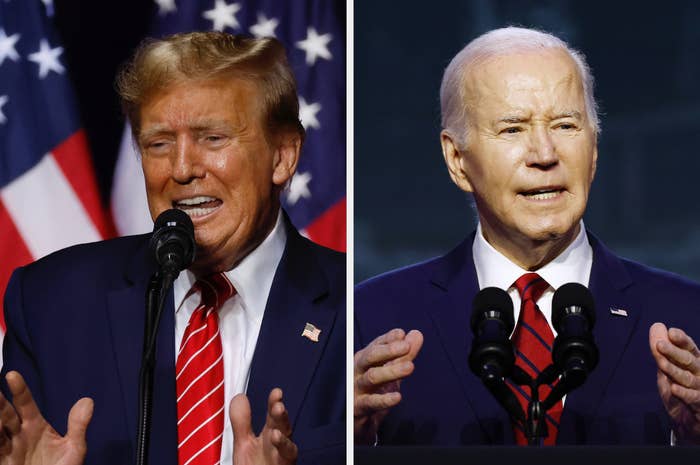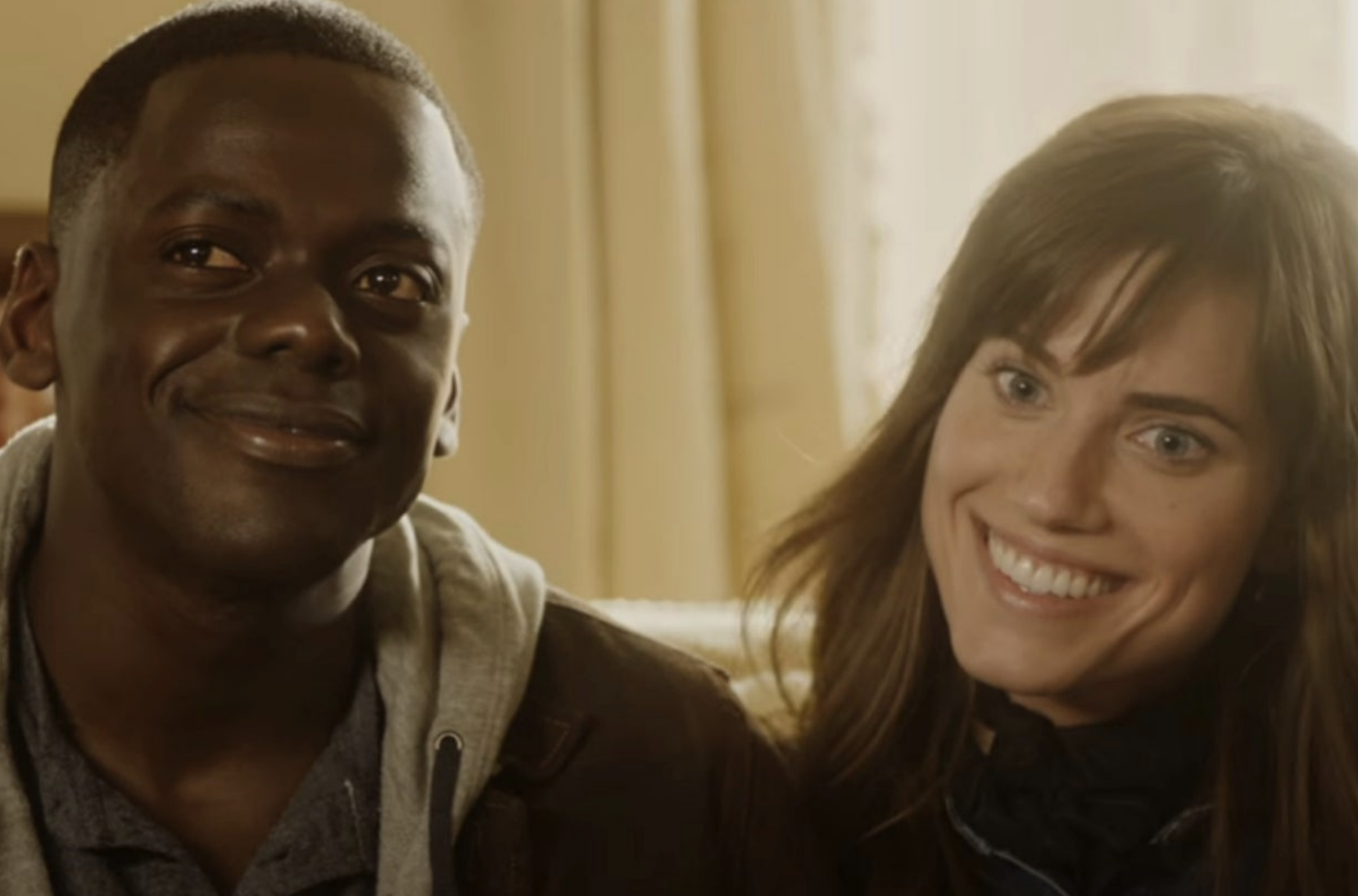2024 is arguably one of the most divided election years for voters in the US.

I recently asked people who vote differently than their partners how it's affected their relationship, and they had a range of responses. Here are the most fascinating ones:
1. "My partner leans right, and I lean left (though neither of us is extreme). I'm not going to lie; it's been rough at times. He'll say something that is either a conspiracy, makes no sense, or has nothing to do with any real issues, and it breaks my heart that the person I love most in the world believes these things."
"I try very hard not to engage and am usually strong about shutting down any debates or if he makes a demeaning comment towards a Democratic politician because it generally (but not always) doesn't change either of our views and spends too much energy on anger and frustration."
—Anonymous
2. "My spouse became extremely conservative after joining law enforcement. I'm really liberal, and the arguments have gotten pretty horrible in our house. I'd be lying to say I haven't considered divorce over it; however, we have younger kids together. To keep the peace, we don’t discuss politics."

3. "I think that sometimes it can be a testament to how much people can change and grow. I live in the Midwest, where there's a high number of conservative Republicans. I grew up in a small town, and for the early part of my life, I would have classified myself as Republican. Then, I moved to a bigger town, went to a university, met new people, and experienced the world and other perspectives, and it slowly changed my mindset and voting alignment. Now I strongly identify as liberal, and while I don't agree with many conservative policies anymore, I can understand in some ways (not all) why small town, rural populations believe as they do. They truly have never experienced anything else, and expressing ideas outside of that would be hugely isolating."
"I met my now husband in 2018; he had just moved to my city from a small town. I was very passionate about politics and current events at the time, and when he mentioned that in 2016, he had voted for Trump, that was almost the end for me. But, he was very open at admitting he didn't have a long of strong reasons WHY he did it… he wasn't very politically involved or informed. It was mostly due to the constant one-sided propaganda he was subjected to back in his hometown. He got really curious about my views and knowledge, asked a ton of questions, and seemed really open-minded to learning about and talking about politics from a curious mindset, NOT from a closed mindset. He even challenged me and my viewpoints in new ways I didn't expect. Fast forward to today, and he definitely doesn't support Trump. But I'll admit he's not nearly as liberal-leaning as I am, and it has nothing to do with human rights. He is a full supporter of gay rights, Black Lives Matter, women's empowerment, and everything else that falls under basic human rights. He gets really curious and frustrated with politicians on both sides when it comes to fiscal and economic policies, and that's where his criticism of both sides lies."
—theuser102487
4. "We used to fight about it a lot, but as we discussed it more and more, we realized that we actually share the same values in many areas; we just draw different conclusions from them."
"I highly suggest talking it through as much as you can; understanding where the other person actually comes from and what the logic is behind their beliefs can be an eye-opening moment and a bit of a challenge to think hard about your belief system and maybe re-evaluate it. Obviously, if you feel incompatible at the end, that's fine, but for us, it worked out; we understand ourselves, our reasoning, and each other better after years of long discussions during the night."
—Anonymous
5. "While my husband is still a registered Democrat, there is something about Trump and his brand of Republican that appeals to him but causes a visceral reaction of disgust in me."
"This caused us a lot of grief for the first few years of Trump's presidency, but now we mostly agree not to discuss politics. Our view of marriage is that we were marrying a partner to 'do life with.' We knew that we would grow and change as individuals, and we must be allowed to do that. We're 14 years into our marriage, and when the tensions rise over politics, we remind ourselves that we chose each other to ride out this journey by each other's side, wherever life takes us individually."
—Anonymous
6. "My hubby is a conservative, and I'm blue to my core! We rarely discuss politics because it can get pretty heated when/if we do. It pisses me off because he is only conservative because all of his old, rich, white male friends are, and they all love Trump because they all have money. However, we are poor!"
"Literally like poor on food stamps and Medicaid, and he has no comprehension of how bad the Republican policies since Reagan have made it, it's impossible for us even to reach the middle class. So we just don't talk about it. I've bartended for 25 years, and the one rule at my bar is not to talk about politics or religion!"
—Anonymous
7. "Over nearly two decades of being together, my partner and I have grappled with this very issue. Initially, I didn't fully appreciate how divergent political and social perspectives could impact our lives. It stings when my partner votes for someone whose policies directly infringe upon my rights and those of others."
"Heated discussions have been a hallmark of our relationship, but we've also accepted that changing each other's opinions is an unlikely feat. Our voting process has become an inside joke: we cancel each other out. On election nights, our home transforms into a battleground of ideas. To maintain peace, we've established a simple rule: check in with each other before diving into contentious topics. This ensures that we're both emotionally prepared for the conversation. After all, sometimes our brains need a moment to catch up with our hearts."
—Anonymous
8. "We can't talk politics at all. Even if everyday issues come up, we have to be very careful, or an argument will ensue."
"We used to be much more aligned, but his views shifted when he was laid off and struggled to find work. He now became the 'heterosexual white male' who was being discriminated against and blamed for the diversity & inclusion programs. Since then, he has leaned more to the right and has lost all empathy for others who have been marginalized or discriminated against since the beginning of time. It is really tough at times to have a normal conversation."
—Anonymous
9. "While I am a registered Democrat, and my husband is a registered Republican, we both tend to avoid blindly voting with party lines. He voted for Trump in 2016, and I was very upset, but I saw the shit show over those four years, and he didn’t vote for him again in 2020. I think what makes us work is that we’ve both been very respectful of the other’s opinions even when we disagree and do our best to avoid coming off preachy."
"We do the same with our religious views. I'm an atheist, and he's agnostic. We've also taken time to consider each other's arguments and have grown or evolved our opinions. We both have some hard lines that the other knows about. I would never tolerate red pill bullshit, and he has a zero-tolerance policy in badmouthing God. We made sure to discuss those things and stay open to negotiation with others. He has come a long way from when we first met on women's issues and learning about why they are so important, and I've changed some of my views from a fiscal perspective. The bottom line is that political issues are nuanced, just like people. And you have to be respectful."
—Anonymous
10. "I got him to actually register to vote in 2023 for the first time. I said, 'You can't talk all this junk about my views if you don't even vote for your own.'"
—Anonymous
11. "I'm a woman of color leftist dating a white guy who describes himself as an old-school liberal. The sad thing is that he used to be further to the left before we met (he voted for Bernie in the 2016 primaries). I didn't dig into why that changed, but he said he found that leftists were hypocritical."

12. "Unpopular opinion here but we just accept it. People can think differently and still be friends. It's okay; the world isn't going to explode."
"We've had lots of different conversations, opening both our eyes to certain things and solidifying our beliefs, but overall, we speak calmly and respectfully about it, and the love always comes out on top. I'd rather disagree than live my life without this person. It's that simple."
—thegassygoose
13. "My husband is a Republican, and yes, he did vote for Trump. But he's not a Trumper where it matters to me. He cares about women and their rights, he's not racist towards anyone, he cares about the LGBTQ+ community, and he forms his own opinions. He doesn't just follow mindlessly. My husband just wants his gun rights, and he chose the lesser of two evils because, let's be honest, Biden isn't doing a great job either."
"Now, if I had met him and he was a racist bigot who loved Trump, then no. We would not be together right now. But when all is said and done, he is an amazing husband, thoughtful, sweet, kind, caring, and intelligent. So the whole Trump thing isn't a huge deal to me."
—blondefk7
14. "To base your relationship status on political views is wild. You should be able to talk openly about it and make an attempt to see the other side without fear of being insulted. I know my partner does not share my political views, but that's ok. It does not mean I love her less. She's the best thing that has ever happened to me. The president of the United States can't change that."

15. "Forget it. If my partner planned to vote for Trump, we would be done. There is no arguing with sucky personal values."
16. "We're both 'liberal' and leftist and vote Democrat (reluctantly sometimes), but with local politics, we often have different policies/strategies in mind, but we try to each make our case, and sometimes one of us will change their mind."
And finally...
17. "My husband and I belong to different parties. (Yep! The two main ones!) We found that by talking about issues there's a lot we actually agree on. Our values are usually the same, but we often disagree on the practicalities of certain solutions or what the solution should be."
"However, we hear each other out, and if things do start to get heated, we pause the conversation until our emotions are cooled down. To be honest, neither of us thought we would marry someone in the other party, but I don't think we'd change it."
—Anonymous
If you're a conservative-leaning person with a liberal partner, share how it has impacted your relationship in the comments below or using this anonymous Google Form. Your response may be featured in an upcoming BuzzFeed post.
Responses have been edited for length/clarity.
